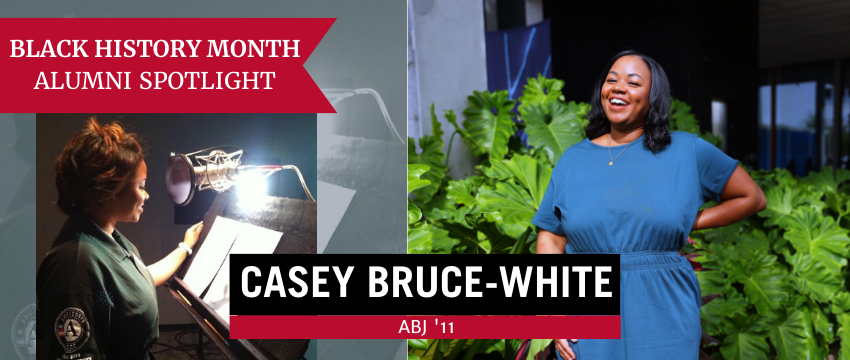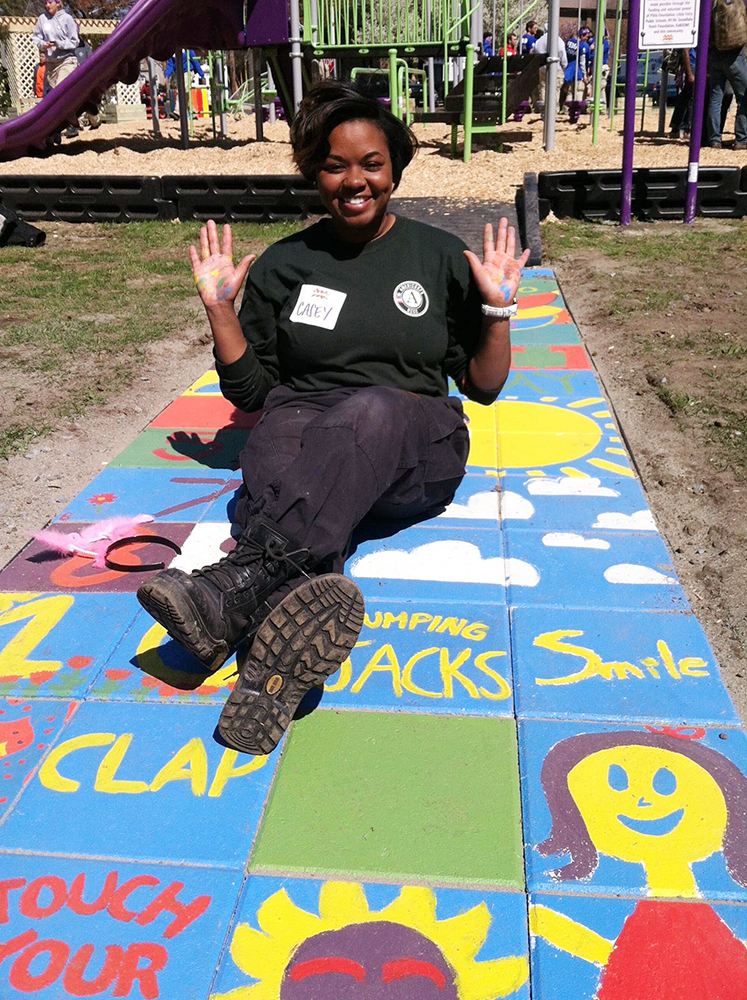Alumna Profile: Casey Bruce-White

Alumna Profile: Casey Bruce-White
This is the third in a series of profiles celebrating the work of our alumni for Black History Month. Please see the newslider at the bottom of this article for additional profiles.
Casey Bruce-White (ABJ ‘11) is deputy director, program and strategy for Affiliate Support and Nationwide Initiatives with the American Civil Liberties Union.
Prior to that, she worked at the ACLU of Florida for 6-1/2 years, serving in multiple communications roles, including the director of communications. She has also worked with numerous organizations including the Miami City Ballet, Georgia Center for Nonprofits and AmeriCorps VISTA. Her articles and essays have appeared in publications such as Florida Today, The Huffington Post and Art Saves Lives International.
Bruce-White was named a Top 50 Women Leaders of Miami for 2023 by Women We Admire, a 2021 fellow for New Leaders Council and a 2017 Miami Girl Making History by the Miami Girls Foundation. She holds professional memberships with ColorComm, a national membership organization for women of color in the communications industry, and she is a founding member of MINO, a professional membership organization that provides emerging Black women leaders with professional development and a supportive network on their journey to becoming world-changers.
While a student at Grady College, Bruce-White was a magazines journalism major and was involved with several campus organizations including Black Affairs Council, InfUSion Magazine and the National Association of Black Journalists. She also went through Safe Space training with the LGBTQ+ Resource Center, volunteered with the afterschool youth program at Rocksprings in Athens and was a resident assistant for two years in the Reed Community.
She lives in Miami with her husband, Corey, son, Gabriel, and dog, Bella.
Following are excerpts of an interview with Bruce-White that have been edited for clarity and length:
What experience during your time at Grady College had the biggest influence on where you are today?
Being a student in Grady College was one of the best experiences of my life. I remember the day I found out I was being admitted to the school. It was a day filled with joy and acknowledgment of a lot of hard work I had put in after experiencing some struggles to adjust to college life and academia during my freshman year. When I was admitted to the school, I felt like I was finally in a good groove.
I was fortunate enough to learn from two amazing professors who became my mentors after I graduated from Grady College. They are the late Conrad Fink and Valerie Boyd. Without them, I don’t think I would have continued to pursue a career in advocacy communications. In early 2011, Professor Fink told me (after I was late to another one of his classes), that I was a “screamer” and that my best writing happened when I wrote about things that pissed me off. Well, he was right. I have spent much of my career in movement work on behalf of historically marginalized communities, and specifically Black and Brown people. I have written about everything from voter suppression to paid sick leave and abortion access. I have never forgotten what he said, and it drives me to keep writing and organizing on social and economic issues in the pursuit of equity and justice.
Professor Boyd was another Grady College professor who meant the world to me. She was the first Black professor I had at Grady College, and that representation mattered so much to me. She helped me learn how to focus my writing to become more clear and more persuasive. Professor Boyd was very serious about helping her students succeed, and because of her, I was able to connect with other writers in Atlanta and work with them as they started their own online newspapers and magazines. I eventually launched my own online blog with two friends in 2016. Professor Boyd taught me so much, and I owe a great deal of my success to her. She had a profound impact on me, and I honor her life and friendship through my work.
What led you to your current career path?
At the end of my junior year at UGA in 2010, I was fortunate enough to get picked for an internship with the Sadie Nash Leadership Project, whose mission is to strengthen, empower, and equip young women and gender-expansive youth of color as agents for change in their lives and in the world. Operating at the intersection of love and rigor, the Sadie Nash Leadership Project uses popular education to build community, critical consciousness, and college and career readiness among participants. This experience changed the trajectory of my career, and I have never looked back. I have used my training as a journalist to propel me into a career of advocacy communications, movement building, and organizing in pursuit of disrupting systems of power and oppression that harm historically marginalized communities. My work now is not so much a career path as it is a life calling in the spirit of good trouble to push our country to change.
What is one piece of advice you live by?

Two pieces of advice I live by are No. 1: Believe it can change and No. 2: Love at the center. The struggle for liberation is ever-present, and the work to dismantle systems of oppression and harm is urgent. It is easy and understandable to see these challenges as insurmountable. But I lean on my ancestors, learn from my elders, and I am inspired by so many folks doing this work every day. They make me believe it can change, and I live by that advice. Separately, I recall someone at a conference once telling me that with love at the center, the change that we seek is possible. That rocked me to my core and made me think differently about how I approach this work for justice. With love at the center, I believe we can and will make our country a place where all people can live with dignity and thrive.
What advice would you give to young students of color who will soon enter the workforce?
There are so many little nuggets of wisdom I have learned from other great leaders I have encountered that I think would be helpful for students of color entering the workforce. The first would be to find a mentor. Seek out people who are doing work that you want to do, and befriend and learn from them.
The second would be to speak up for what you know is right. We all have a moral obligation to do the right thing, and that’s not just societally, but it should be a part of your day-to-day practice. Just because something has been a part of the company’s culture does not mean it’s the right thing. This could also mean urging your company to expand its policies to meet the needs of workers now. I would urge young students of color to question policies that are not aligned with the mission or that don’t center EDIB (equity, diversity, inclusion, or belonging) and urge leaders in the organization to make changes. Whether that’s speaking out on bad behavior in a workplace or urging your company to expand paid family leave or mental health days. Be brave for what you know to be right.
The third would be to seek out opportunities to help you grow your expertise and skills. Approach life with curiosity! There are so many free workshops and seminars available to us. There are also opportunities that cater specifically to students of color in a variety of different fields. Never stop learning or trying to grow and expand your expertise. Also, join professional groups or spaces that center people of color.
Lastly, imposter syndrome is a very real issue for many people, but particularly women of color. For example, women of color who suffer from imposter syndrome will often not apply for a job they are qualified for if they don’t believe they meet all of the criteria that are listed in a job description. News flash: No one has all the skills listed in a job description! Remember that you are powerful and can learn new skills. Apply for that job or other new opportunities. And, if you need help navigating imposter syndrome, speak to a healthcare professional or a life coach. They can help you build confidence and learn how to manage feelings of imposter syndrome, especially in relation to work.
What does Black History month mean to you?

Black History Month is an opportunity for us to reflect on the contributions, culture, and lived experiences of Black folks in America. It is a way for us to honor our ancestors and elders, teach our children about the struggles we faced and are still facing for equity and justice, and envision a future where Black people are safe, valued, seen, believed, can thrive, and live here peacefully and with dignity. In addition to Black History Month, I celebrate Black Futures Month, which is a forward-looking lens and vision for what Black freedom can look like. This month is a time for reflection and celebration. It’s a time for work, rest, joy, and resistance. As we are living in a time where teaching Black history is being threatened by state governments all across our nation, this month means everything to me. As a new mom, this month presented a new opportunity for me to teach my son about the power of his community and the beauty of his culture. That is powerful. This month is a space to celebrate our history and to imagine a world where all Black people are free.